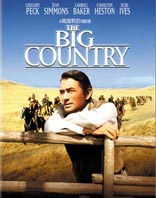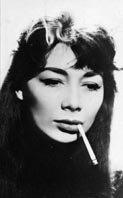|
Reminiscences of my noviciate
at Broome Hall 1961-1962
by Wim
Hofman

Arrival
It must have been September 1961. I was one of a little group
of Dutchmen that went to Broome Hall near Coldharbour Lane in Surrey,
England. A Zeeland Company ship took us from Hoek van Holland to Hull.
From the ship we looked down to the family of some of us who could not
stop waving. And we saw how our luggage went into the belly of the ship,
green metal trunks like on the first pages of the strip album 'Tintin
in Congo'.

We were all trained by the White Fathers and wanted to
go to the noviciate (a duration of one year). We went by train to London
and then by bus southwards to Holmwood where we had a little meal before
walking to the house where we should stay for a year and we were wondering
how it would be to meet other fellows coming from different parts of
the United Kingdom.
Our English was not too good because most of us had only studied passively:
we could translate texts but we did not have much practice in speaking
that foreign English. It was a nice walk to the house; the weather was
nice and even warm. We had to carry some baggage. I had my old brown
valise and my banjo in a black case that had provoked some admiration
from the Customs people when entering England. They even looked inside
the instrument and smiled when they found not only spare strings but
also socks and a tooth brush, a nail brush and other useful things.
They put a sign on the luggage with red chalk. They had also looked
in the pockets of my raincoat, whereupon they found nothing. I had a
fancy coat because people had told me that in England it rained every
day.
I got a little room on the first floor at the south side of the sandstone
building. There was a window that I could open. You could look out on
to a terrace, a kind of lawn, a lake with a diving tower and a nice
landscape with rolling hills and trees here and there. From time to
time there was mist hanging over the land, the trees showing just their
tops above the white clouds. I loved it immediately and I liked my little
room. There was a little table and a chair so that I could read and
write—also, a small bed and a cupboard with drawers. In the room
there was fireplace as well, but when I tried to make a fire once the
whole room was full of smoke. The chimney had not been swept and when
I tried to clean it a little bit down came a lot of little branches
and a dead bird. Later that year we started to clean some of the many
chimney pipes (a dozen or so).
My neighbour was David Airley, who came from Dundee. He was a
good piano player, but I didn't know that yet. I had to share a bathroom
with him. It was a nice bathroom, a Victorian one, with a copper plate
before the tub, to warm your feet and pipes to dry towels. The apparatus
worked only a few weeks later, when the heating was on.
Being a novice was serious business. We had to rise rather early in
the morning. Someone walked around with a bell, he said something and
we, so was told, had to answer: "Deo gratias". Some of us
did.
Then we had gym. The British novices called it P.T. But it was introduced
by the Dutch that stayed in the house before us, they told us. We ran
around and did exercises. Some of us were appointed to train us. After
that we had religious exercises, prayers and meditation in a room where
there was an altar and pews with kneelers.
There was also a harmonium. I remarked that David was the one who played
the instrument and I was always glad when I saw heard him play. I asked
him from time to time to play a little melody for me and he was so kind
to do that. So I remember that he played some lines of 'Take the A-train'
or trying to stir in a little bit of boogy-woogy during the service.
We Dutch had to learn to sing some English hymns and we smiled when
we sang 'Holy God we praise Thy Name', because the melody is used in
our country to sing "Mother our crow is death" ( Moeder
onze kraai is dood). There were also new Vespers to sing. But often
we sang Gregorian chant. Our conduct in the chapel had to be very strict
and pious, particularly when Father Van den Bosch was celebrating.
He was a precise man. He was not a good singer. At the end of a high
mass he sang: ite-we-we-we -we we etc. He was very serious, observing
each of us thoroughly through his clean glasses.
I do not remember how long those religious morning exercises took but
I think we were glad when it was time for breakfast. We sat at long
tables. The staff, consisting of Reverend Fathers and Brothers, were
sitting at a separate table, with Father Van den Bosch in their midst.
But often he was sitting alone, cleaning the clean tablecloth with his
rolled-up napkin. Out of the kitchen came the smell of bacon and eggs.
An English breakfast was new to us Dutchmen. After prayer was said,
the porridge came in. Some novices rolled it in on a trolly that made
a rattling noise because the the wooden blocks of the parquet floor
were loose. Most of the novices ate this water-cooked porridge sprinkled
with cold milk and some sugar. I saw Dave putting a lot of salt on his.
He explained to me that he was a Scotsman, not to be confused with as
an Englishman. He was glad to meet Dutchmen he said, they were more
like Scotsmen. But I put salt on my porridge only once.
Jimmy Brown agreed with Dave. He came from Scotland too and was
reluctant to hear my dog-r. You talk like a Scotsman, he said. He asked
me if I liked bagpipes and when I agreed, he said "I'll show ye."
One day he showed us his bagpipes. He had even a Scottish dress, a kilt
and a cap and stockings and he started playing Loch Lomond. They told
him to play outside and I went with him because I wanted to hear and
see him playing. But when he played outside they told him to climb on
top of Leith Hill to play from there.
He showed me how bagpipes work, how to blow and explained the function
of the reeds. I never asked him to play with me, he on his bagpipe and
me on my banjo. I proposed Dave to play together. In the room where
we gathered for classes and spiritual readings (given by Van den Bosch)
stood a nice piano. When Dave started to play "Happy Days Are Here
Again" it became clear that there were special rules about playing
music at Broome Hall. Only on very special occasions was civilised music
allowed.
We had the impression that our noviciate became more severe from day
to day. It will change, some of the novice told us, after the Thirty
Days Retreat.
We had classes. French classes were given by Fr Bernard Joinet,
a Frenchman who spoke English rather well but with a strong French accent.
I remember he told us about the Algerian war and posed us the question
if in wartime it is permitted to torture people. Probably he had been
a soldier in that war. He explained to me that you could see everything
as a symbol and he pointed to the sun that was setting. "Look!"
he said "The symbol of the sunset!"
He liked to play tennis and put us to work to make cement to build a
tennis court. But the result was not a good one, the day we put down
the concrete it was raining cats and dogs. He also liked to fish in
the lake and to canoe. In the winter he went away for a few days to
ski somewhere in Scotland.
A recent photo of Fr Bernard Joinet can
be found on Page 99 of the GALLERY (taken 2002)
There was an awful lot of work to do in the gardens, clipping bushes,
mowing grass, weeding, cleaning, and digging out the roots of brambles
and trees. We had to work in the vegetable garden too. Brother Albert
Gardner gave us instructions. But there was Mr Yeomans also.
I remember endless rows of parsnips we had to thin out. Mr Yeomans explained
to me what parsnips were and how to thin. I remember also that I had
to go to pick some cabbages. Armed with an iron basket and a kind of
sword I went to the vegetable garden and cut off some nice round heads
of red cabbages. They had to go to the kitchen. We had to work there
too. We had to peel potatoes and clean big aluminium pans.
Henk Jansen wanted to wax the floors in the house. We used melted
candlesticks . We worked like madmen. The floor never became shiny.
Henk also started to prune the fruit trees in the orchard. He was the
son of a greengrocer and told us he knew about apples and pears. We
dug holes and connected up a water pipe to the caravan where the lady
who did a lot of washing and ironing stayed . We collected a lot of
leaves and made some compost heaps. Some novices made Stations of the
Cross of coloured concrete and put them in the park.
We had to set the tables. We did it quickly because this gave us more
free time. We ran along the tables with forks and knives etc. Often
there was a spoon or knife missing. We were too much in a hurry. The
person who had no fork or spoon or knife stood up and went to the kitchen
to pick up an utensil.
Often there was silence during meals. Someone stood at a desk and read
from a book. At a certain moment Father Van den Bosch was giving a sign.
He was annoyed. You could see that he was cleaning the very clean linen
table cloth with his napkin. He explained that there was no running
any more during meals. A novice who had no spoon should stay at his
chair and not have soup. The next meal he, the novice master himself,
had no spoon next to his plate. He knew immediately who was the one
who had taken away the spoon. He ordered me to get a spoon. It was a
dangerous moment.
After dinner I had to go to his room. He wanted to talk. He was kind
to me. I had to become more serious. And he had noticed that I was often
writing. He asked me what I was writing and I showed my diary: two big
notebooks. He wanted to read them. And after some days he gave back
my diary and he asked me to burn it and I burned them underneath the
washing boiler.
At that time I was very obedient. Obedience was the highest virtue.
He had seen also some drawings I made and that is why I was appointed
as 'florist'. I had to put flowers and branches with leaves in vases
and I did my best to make nice creations for the chapel, also decorating
the special altar in the conservatory for Holy Thursday (when there
were prayers the whole night long).

(L-R) : Emmanuel Gielen, Anton
Oostveen, Ben Moelands, André Blewanus, André Postma,
Fr Siwinda (?), Piet van Heijst
Just before Palm Sunday, we had a storm and an enormous
branch from the blue cedar came down near the house. We sawed off branches
that we could use for the procession in the garden. But there was a
lot of wind and I had to put some stones on the linen on the little
table that was used for the ceremony and the pile of branches was nearly
blown apart. I remember Fr McSherry was the celebrant. The branches
were difficult to hold straight during the procession. In fact they
were rather big and difficult to manipulate (we had a branch in one
hand, in the other we had to carry our Liber Usualis with its rather
thin paper. But that was nearly at the end of the big Retreat.
But first we had to get our white clothing. As I was not very rich,
I had simple cotton clothing, nice when new , but the gandora soon became
rather short after some washing and shrinking. I found the shrinking
had a rather practical result .You could move faster and run the staircases
up and down with a short gandora.. But Father Van den Bosch ordered
me to slow down and move in a more civilised way and to take the stairs
step by step.
We Dutchmen got also some explanation about British etiquette and at
the end we knew how to eat green peas with a fork in the British way
and we even knew that we should not clean our plates at the end of a
course. That was a pity because the food was either good or excellent.
I remember the stews and the parsnips and the warm desserts: cakes with
syrup or gooseberries with cream. Not everything was new for me. I was
amazed to see in the kitchen the jam tins. I had seen them when I was
little: I had met British troops at the end of 1944. They stayed in
my kindergarten and we children were allowed to move among the soldiers
and saw them shaving themselves in the morning and and eating toasted
white bread with marmalade or red jam that they took out of big jam
tins . . . .
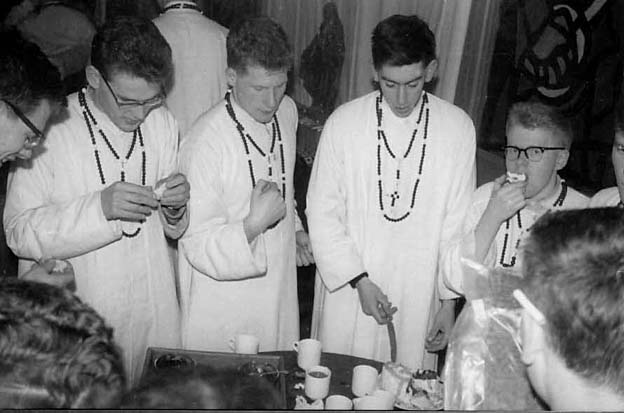
There was more in Broome Hall that reminded me of the Second World
War. In a cupboard I found a pile of magazines called CHOIX, in which
there were short stories and poetry written during the war in France
and in Great Britain. I started reading them, and so I read poems of
French poems, French and English poems. I remember how exciting it was
to read reading the poem 'LIBERTË' by Paul Eluard, or the poems
of Dylan Thomas. I found also texts about the artist Stanley Spencer,
an extraordinary painter I never had heard of in the Netherlands. I
remember also reading Chesterton's 'Orthodoxy' and the children's poems
of Hilaire Belloc and Edward Lear, the life of Cardinal Newman, the
amazing poems of the Jesuit, Gerard Manley Hopkins.
That year there was much fuss about a book of a certain Bishop Robinson
who wrote that you had to find God in yourself. I did not read his book.
I read also some Rodriguez. S.J. He explained in his book that if you
want to straighten a bent stick you have to bend it thoroughly in the
other way. He had a rather negative idea about mankind, I thought.
Sometimes I went to a room that was called the library not to read but
to mend my white stockings. In that room the music records were also
kept, along with the pick-up. I remember I often put on the symphony
of César Franck.
Often I had big holes in my stockings.

Fr Beckwith, Fr Van den Bosch
and Bro Mullen in the recreation room at Broome Hall
Christmas was a nice time. The British idea of Christmas
was quite different from ours. There was an emphasis on much food, minced
pies, pudding, a lot of sweet things, joy and feasting. I remember the
ballons and crackers. It was a nice winter. We cut a lot of wood for
in the fireplace in the recreation hall, where we had put up a Christmas
tree. With Henk Jansen we had made a Christmas stable made out of roots
of trees, and I had made pseudo stained glass window with paper images
of angels, one with a banjo.
There was a piano in the recreation room, but the instrument was not
tuned for years or could not be tuned.. We had sing songs , I think
animated by Pat Shanahan, a lively and helpful man. He helped me to
improve my English. At Christmas time I was still not able to speak
the language very well. There was not much time to speak. I remember
Brother McLeod putting the Christmas tree on the fire. There
was huge flame and we had to use the fire extinguisher. A lo of white
foam made a very white end of that Christmas time.
There was snow and then the lake froze. Some people went for a swim
in the ice cold water. There was some betting. We climbed Leith Hill
in the snow and from there the whole world seemed white. It was amazing
also because coming from the Netherlands I was not used to hills.
Some left us, one of them Larry Shine, I believe. There was no
explanation. Perhaps he smoked at times when it was not allowed. There
were only special hours or moments for smoking. A lot of us smoked,
cigarettes, shag. I had my pipe but no tobacco. There were small packets
of Player's with 6 cigarettes in it, but they were very expensive for
us and I didn't like cigarettes—certainly not the British ones
that had a sharp taste and made you cough a lot.
One day I was put into another room, in the new wing, next to a pond.
I liked the ponds, especially the oval one. There was no water in it
but a lot of sun and it was a fine place to sit in: sun and no wind.

André Postma (left) and Kees Neeft at the 'little pond', Broome
Hall
I was reading a lot at that time and thinking about life
and vocation and as a romantic young man it was not difficult to get
religious thoughts and feelings at that nice place near the peaceful
North Downs.
The Thirty Day Retreat was like being brainwashed. You did it yourself.
There was silence and there were exercises. I took it very seriously.
You had to start to close your windows and to descend into hell and
to go to the light at the end and it was definitely an exercise in imagination.
I think it influenced me deeply and not only me: we were all very tired
at the end. I remember I could hardly manage the wheelbarrow. But the
exercises were planned on a splendid moment: it ended with Easter and
spring and sunshine and more free time.
I remember nice walks in the hills and tinkering. I can still see still
Maurice Cunningham picking up mushrooms along the paths climbing Leith
Hill. He cooked them later in his pan. He carried always a rucksack
during walks, with ladles and pans hanging off— and he made noises
like a walking disco. We walked to Abinger Hammer, to Shere, even to
Guildford and Horsham. Mike Kelly told me about the Roman roads
all along England. And he showed me one in the neighbourhood of Capel.
He told me also that during night you could hear the Roman legions walking
through the hills from time to time.
One afternoon there was an alarm. We had to close our windows. A huge
swarm of bees came to the house. They did not enter by the windows but
along the dining room chimney with its dark golden ceiling. We stuffed
some of our grey blankets up the chimney and we went up to the roof.
Alf Harrison, who was always whistling, said that it should
take days to get the bees smoked out and Charley Bingham wanted
to stay on the roof and camp there.
In the lake there were two canoes. There was one good one and one with
a leak. We got some tar from along the roads and made a fire and melted
the tar. With an old ladle, Teun Thomeer and I put then tar on
the bottom of the old canoe. There was no leak anymore but the thing
was not in balance, floating deeply and nearly sinking. Somewhere on
the lake the good canoe attacked us and threw waterlillies towards us.
We capsized and so I lost my spectacles and because I did not want English
glasses I asked swimmers to dive for mine. Amazingly, they found them.
After that it was forbidden to canoe.

Fr Joinet though took the best one and wanted to show us how you use
a canoe. He had studied in Canada. He wanted to go fishing and he was
standing up in the canoe while paddling. Standing upright, he started
fishing but when he threw in his line he fell into the water. End of
canoeing.
In the meantime I was writing—no diary any more but stories. And
I was drawing and painting. I have still some drawings from that time,
some done on blue writing paper; and the stories were published in 1969.
Because they knew that I painted, I was set to paint walls. I noticed
the British taste was for colours such as light blue, light yellow,
pink and light green. I had to paint the wall in what I call 'classroom
light green'. But the wall showed several brown spots due to humidity
so I painted here and there things in metal (aluminium) paint first.
It was fun to do. At the beginning I painted some dots but soon I was
painting figures, sun and moon, faces, ships, birds etc. Then this paint
had to dry. Father Van den Bosch was astonished, but before his spiritual
reading started, he gave the novices five minutes time to admire my
creations. The next day I painted the wall light green. There were more
painters. Two of them were busy in another room, painting the ceiling.
They used a ladder and suddenly I heard some betting was going on. I
bet you do not dare to fall with your bucket of paint. After that I
heard a lot of noise and when I ran towards the room I saw someone lying
on the floor in a big splash of white paint.
From time to time we were doing some washing. We boiled our overalls
and other things with some soap in a boiler. You poured water in it
and burned wood underneath the thing. We threw some clothing in it and
I remember we also added a red carpet. The result was purple overalls
and some pink burnouses, a kind of mantles with a pointed hood with
a little tassel at the pointed ends. They sure were useful in winter.
In summer they were a burden.
We Dutchmen noticed that each time the name of Jesus was pronounced,
novices like Maurice Cunningham, Joseph Mullen and other
Irishmen bent their heads. Even when we used the word Jesus as a stopgap,
like people do in Holland. We tried to be careful. I think the Irish
were more pious than we were. They also said the Rosary more often and
although they had a rosary around their necks they used smaller one
they carried with them in their pockets. They also explained to us what
the shamrock meant to them.
Meals were enjoyed in silence, but from time to time there was no reading
and records were played instead. We had a small selection of classical
music and so we heard Mendelsohn and Grieg (who was Scottish, according
to Dave) and for much of the time there were rather romantic concerts.
But one day someone put on 'Le Sacre du Printemps' (below) and the rather rhythmical
parts had a special effect on the novices who were eating their meat
and potatoes: they started following the tempo of the music and were
moving their forks and knives, following Strawinsky's obstinate rhythm.
At a certain moment all of us started laughing. Father van den Bosch
asked for another record. He tried not to smile.

(L-R) : André Blewanus, André Postma, Fr
Siwinda (Nyassaland), Tony Henry (brother novice), Kees Neeft,
Jimmy Brown (brother novice, later in Marienthal, Luxembourg), Piet
van heijst, Fr Van den Bosch,
Kenneth Slide (brother novice), Anton Oostveen, Michael Foley, Fr Kamya,
Paddy Russell, Emmanuel Gielen.
At the end of that special year we were more or less separated. And
we said goodbye to our fellow novices, Jim and John and Joseph and Eddy
and Maurice and Charley and Alf and the little brother Hammond
with his red hair, and to Mike and Michael and to Dave and Pat and Father
Van den Bosch and brother Casimir and Mrs. Sterling and Mrs Fox, the
cook, and all the others. A lot of the novices went to Totteridge, a
few had to go to Vals, in France and John Bloem and I left for
Heverlee in Belgium.
We went back to Holland by Dakota. I think it was Teun Thomeer's idea.
The plane was full. The stewardess had to sit on the floor after having
sold a lot of cigarettes. We wanted to get rid of the British coins,
pennies, shillings etc. On my lap I had the black case with my banjo
which I did not use really during a whole year.
Wim Hofman
Vlissingen November 2007
Stravinsky's Rite of Spring can be seen (and heard) via Youtube:
Le Sacre Du Printemps by Pina Bausch Wuppertal Dance Theater
http://www.youtube.com/watch?v=KXVuVQuMvgA
|
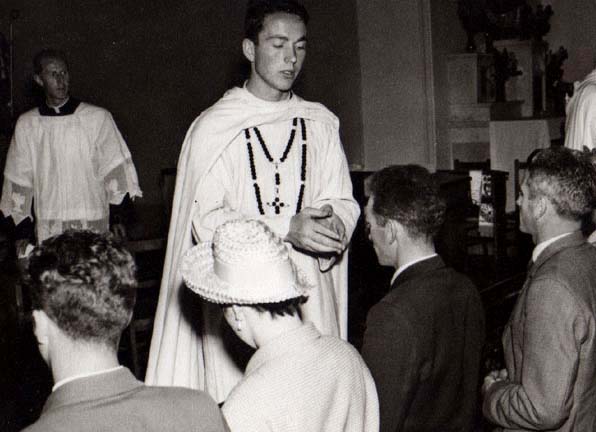

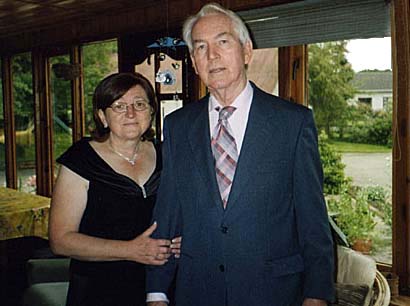
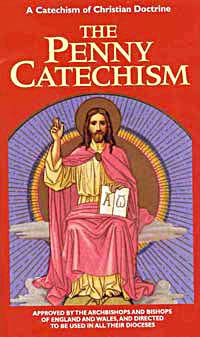 This is probably not the version of the Catechism that I had as a child. The paper cover of mine was a deeper red, as I recall : it was the cheap edition, re-printed during the war, when a penny was a significant find for those of us who assiduously scanned the pavements for coins on our way to school and back.
This is probably not the version of the Catechism that I had as a child. The paper cover of mine was a deeper red, as I recall : it was the cheap edition, re-printed during the war, when a penny was a significant find for those of us who assiduously scanned the pavements for coins on our way to school and back.







